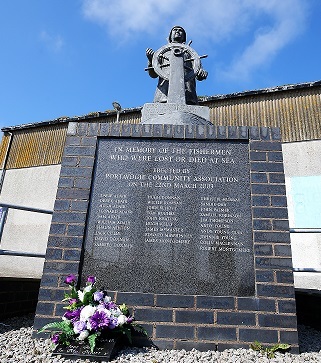Leslie Girvan was a fisherman for 42 years. He first went to sea as a deckhand in 1959 at the age of 16.
“The first boat I worked on was the Summer Rose skippered by Frank McDonald.
“I had been training as an apprentice chef but when I saw the money my friends were making as deckhands, I decided that fishing was the job for me.”
While his home port was Kilkeel, Leslie found himself hunting for fish all over the world, often as far away as Reykjavik, Iceland.
“In the summer time we would fish for prawns, in spring it was cod and in autumn it was the herring season.”
At the entrance to Portavogie harbour a statue bearing the names of 29 local fisherman who lost their lives at sea is a stark reminder that the ocean is a dangerous master.
The 75 year-old witnessed at firsthand the very real dangers that making a living from the sea can spawn.
“In September 1968 I was on a trawler called the Briar on the east side of the Isle of Man.
“We were fishing for herring and it was nearing sunset that evening.
“There was another trawler travelling behind us. But the sun was in the skipper’s eyes and he didn’t realise how close he had come to our boat. He rammed straight into us and the Briar went down in a matter of minutes.
“Thankfully the crew of the other boat were able to get us onboard their boat just as the Briar was going down. We never even got our feet wet.”
On two other occasions trawlers Leslie was fishing on were accidentally rammed by other boats.

Fishermen memorial: Press Eye
But while the life of a fisherman was often hard, Leslie reminises that it provided a good living for those prepared to face the dangers of life at sea.
“Deckhands made a very good living in those days. Fishermen were kings back then.”
By 1974 Leslie had become a skipper of his own boat, Star of Hope.
A year later Britain joined the European Union’s Common Market.
However, the veteran skipper believes it wasn’t until the establishment of the Common Fisheries policy and the introduction of catch quotas in the early 1980s that signalled the start of a slow and steady demise of Northern Ireland’s fishing industry.
“The central plank of the Common Fisheries policy was to allow all European fishermen equal access to our fishing waters and our catch.
“But if there is only a certain quota of fish that is allowed to be caught in our waters, how do you allow European fishing boats equal access to those waters? They did this by getting rid of as many of our fishing boats as possible.”
He believes EU chiefs adopted a deliberate policy to drastically reduce fishing quotas to force local fishermen out of the industry.
“They cut the quotas year on year so that we couldn’t survive.
“In the mid-1990s they began to offer incentives for local skippers to decommission their boats.
“For skippers who were nearing retirement age, who could see quotas getting reduced every year, it was an offer they couldn’t refuse and many men took the decision to haul up their nets for good.”
More than a decade ago the veteran skipper was one of more than a dozen fishermen fined for breaking EU fish quotas.
At the time, the court was told that severe financial hardship caused by European fishing quotas led fishermen to cheat the system.
While the Kilkeel captain pleaded guilty to the charges, he insists that he was punished as a warning to others.
"Every fisherman in the UK did what we did.
"The authorities turned a blind-eye to it for decades because they knew it was the only way fishermen could survive.
"But they decided to make an example of particular fishermen in every part of the UK. In Northern Ireland it was us."
By the time he finally hung up his own oil skins in 2001 Leslie Girvan had up to five fishing boats at sea at any one time.
Despite having been retired for the last 19 years he maintains a strong bond with the local fleet and was a strong supporter of the UK’s decision to leave the EU.
While he remains optimistic that the good times could return if the local fleet regains control of Northern Irish waters, he remains sceptical that fishermen won’t be sold down the river for political gain.
“Maybe I’m just an old cynic. I’m totally in favour of Brexit, but I don’t believe there is anything that fishermen hold dear that the government won’t trade away if there is something more important to them.
“Be sure one of thing, the fishing industry will be sacrificed, if it comes to that.
“I hope we get our waters back. If we got back half of what we want, it would be a huge boost to local fishermen.
“But the French are saying there will be no trade deals unless fishing arrangements stay as they are.
“Who knows what will happen.
“Fishermen just want out. We want our waters back in our own hands."

Infographic: Chris Scott, The Detail. Data from Brexit and Northern Ireland: Fisheries report

 By
By






